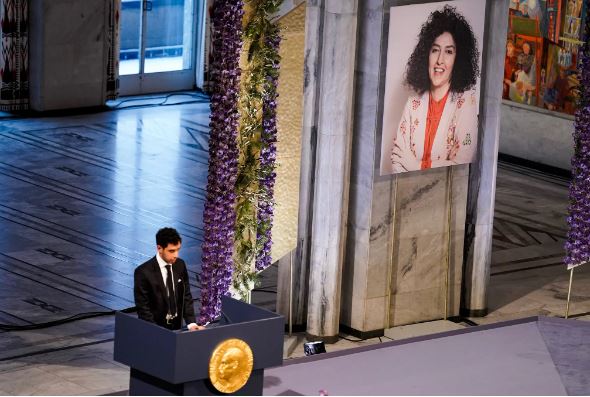Renowned human rights activist Narges Mohammadi, recently honored with the 2023 Nobel Peace Prize, received a disheartening blow as the Iranian regime sentenced her to an additional 15 months in prison, according to her family’s announcement on Monday.
This development unfolded just a day after the release on bail of journalists Niloufar Hamedi and Elaheh Mohammadi. The two reporters, who played pivotal roles in covering the tragic death of Mahsa Amini, were charged for their involvement in reporting on the incident, which sparked widespread protests challenging Iran’s authoritative clerical regime.
Mahsa Amini, a 22-year-old woman, died in the custody of Iran’s morality police in September 2022, triggering a nationwide movement. Ms. Hamedi and Ms. Mohammadi faced accusations of conspiring with foreign intelligence agencies to undermine national security and spreading propaganda. Both journalists spent months in detention, undergoing closed-door trials that led to Ms. Hamedi’s 13-year prison sentence and Ms. Mohammadi’s 12-year sentence.
The new charges against Narges Mohammadi add to her extensive history of persecution. Over the past decade, she has endured multiple imprisonments and faced charges of “spreading anti-state propaganda,” underscoring Iran’s ongoing efforts to suppress her activism.
The latest trial, held on December 19 without her presence, marked her fifth conviction since 2021. In total, her family reported that she has been sentenced to over 12 years in prison, 154 lashes, a four-month travel ban, and two years of exile.
Despite facing severe health challenges, including a heart attack, Narges Mohammadi remains an outspoken critic of the Iranian government. In response to the significant uprising following Mahsa Amini’s death, Mohammadi organized protests within the prison, wrote opinion pieces, and conducted weekly workshops for female inmates on their rights.
The release of Niloufar Hamedi and Elaheh Mohammadi was met with scenes of joy and celebration, with photos and videos circulating on social media capturing the emotional moments as they left Tehran’s notorious Evin Prison. However, the official response from Iranian authorities was swift, filing a new complaint against the journalists on charges of violating the hijab law, requiring women to cover their hair and wear concealing clothing.
This legislation, which initially led to Mahsa Amini’s arrest, has been a focal point for the Iranian government’s crackdown on dissent. Amini was taken into custody by morality police, subjected to a center for re-educating women on dress code laws, and later died in custody under disputed circumstances.
The outrage over Amini’s death fueled nationwide protests, known as the “Mahsa movement,” posing a significant challenge to the legitimacy of Iran’s ruling clerics. The government responded with a forceful crackdown, arresting thousands and resulting in the death of over 500 protesters. Despite these measures, many women continue to defy the hijab law, prompting the government to implement stricter penalties, including fines and prison time.
The release of Hamedi and Mohammadi, along with their public defiance of the hijab law, drew praise on social media from Iranians who view them as symbols of resistance against the government. As the journalists enjoy their freedom, the Iranian government’s continued repression and legal actions against those who dare to speak out raise concerns about the state of human rights and freedom of expression in the country.

